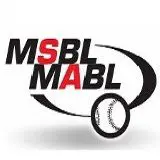The Currie Family Baseball Legacy Spans Three Generations
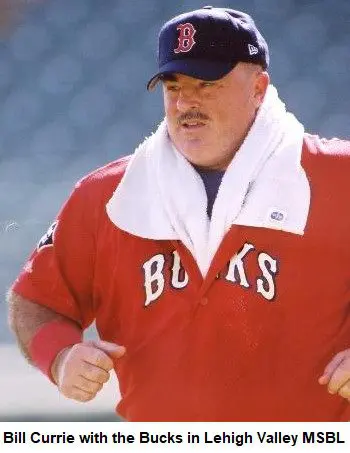
By Steve LaMontia, Director of Communications
73-year old William (Bill) Currie lives in Flemington, New Jersey and plays for the Hunterdon Bucks in the 55-over division of the Lehigh Valley MSBL based in Bethlehem, Pennsylvania. The Bucks have been in the league for about eight years and is the only one in the league from New Jersey.
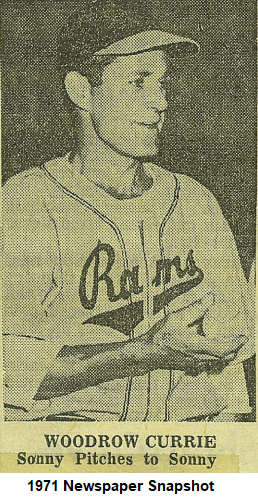
Bill contacted me about a special family love of the game that has spanned three generations, as he was fortunate enough to be teammates and catcher with his dad/pitcher Woodrow ‘Sonny’ Currie and has also been the catcher at the MSBL World Series in the Father/Son division for his own pitcher/son ‘Sonny.’
“I played most recently in the 2007 MSBL World Series in Arizona for the Lehigh Valley Moondogs with Turk Starniri,” said Bill. “I went to Wayne Valley and Seton Hall and also played in the Met League for about 16 years. The article I have provided (below) is from 1971 where I caught my dad in the Met League, where we were battery mates all summer.”
“The 2003 MSBL World Series Father/Son Division in Phoenix allowed me to complete a cycle started many years ago. I caught my son in a Tournament game, just the way I caught my Dad in the Met League many years ago. I can see my Dad in my son when he’s on the mound. I see the same concentration, the grit, the challenging style. Don’t stand too close to my plate – get in the box – you’re keeping me waiting – here, try to hit this!
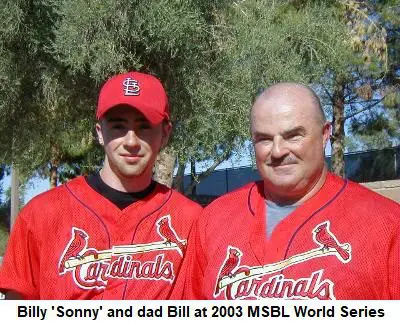
Thirty-two years apart, half a country apart, a different repertoire of pitches, different sizes, different generations – but toeing the rubber 60’6” away – looking in for the sign – it felt the same.
In 1971 it was ‘son catches ‘Sonny’ and then in 2003 it became ‘dad catches ‘Sonny.’ Pardon the pun but, ‘Thirty-two years apart, what’s the catch?”
Bill provided a heartwarming tribute to the baseball bond he shared with his father, both on and off the field. They were teammates, as were Bill and his son ‘Sonny’ in 2003 in Phoenix. Three generations tied together forever by our great game.
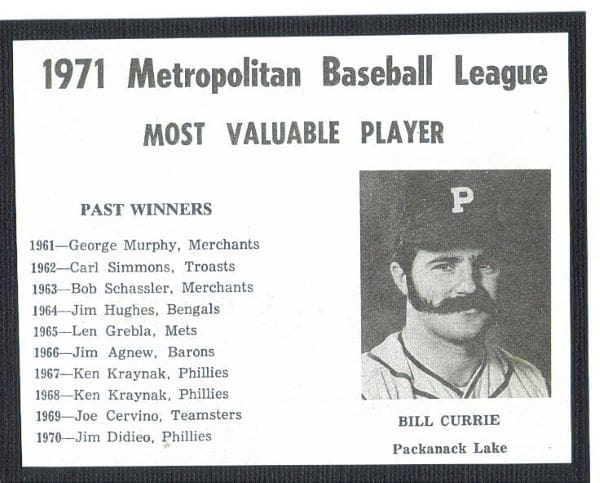
Here is Bill’s story in his own words:
“As a boy of about eight I was in awe of the pitching skills of the very first pitcher out of the hundreds I would catch in my career. The speed of the ball was frightening, although I would later learn it was only half as fast as he could have thrown. The “nickel curve” or as we now all call it, the slider, broke hard and late. I was always surprised to see it break since I had no idea about reading the spin. Lucky for me that this pitcher always told me what was coming. But the overwhelming magic was that the ball seemed to always hit the target. Pitch after pitch after pitch, hitting the glove no matter where I moved it.
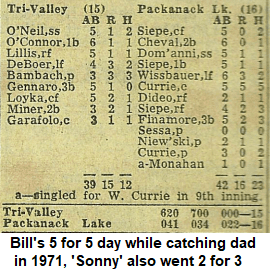
This was my hero. A man who could make a baseball do what he wanted, who loved this game that I was beginning to love. A man who knew everything about baseball, could play the game, and wanted to teach me how to play. A man that people would pay to pitch and others would pay to watch. It was unbelievable to me that I was so lucky, because this man was my Dad. My dad had been an orphan since he was five. He made himself an All State Baseball Player, he was named one of the top players of his decade in New Jersey, played Minor League Ball, and was selected to the Bergen County Hall of Fame in New Jersey. I got him out of retirement at age 55 and caught him in several semi pro games.
But what I finally figured out was what made me so lucky was not all the great things this man had done, but who this man was. This man worked for 30 years in a factory running a milling machine to support our family. He was always out the door at 6:30 in the morning to go to work and he was always home for dinner by 5:30 pm. He never had more than 10 bucks in his wallet, but every one of the seven children in our family completed college. He helped all of us with our homework, especially math and spelling. He fixed everything around the house and most things with the car. He coached my brother and me in baseball, my sisters in softball, and when we moved up and out of the lower leagues, he coached other people’s kids in both. Small children and dogs loved him.
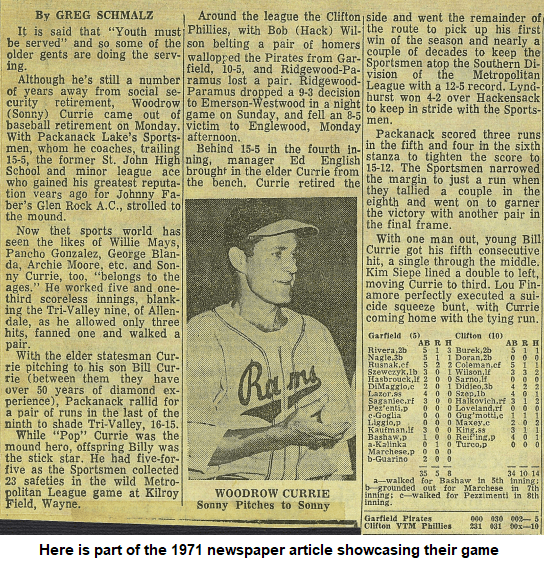
Where did he develop this life work ethic? Where did he learn that working hard should be satisfying and rewarding, because best effort doesn’t always mean you will win? What molded him? Was it the game? Pitching when he was sore or tired, when he had his good stuff and when he was flat. Being the lead dog but realizing it takes a team to win.
Baseball offers so much. Thanks, Mr. Doubleday.
